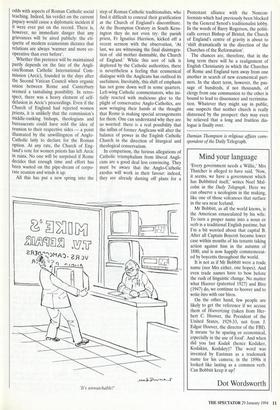Mind your language
`Every government needs a Willie,' Mrs Thatcher is alleged to have said. 'Now, it seems, we have a government which has Bobbitted itself,' writes Noel Mal- colm in the Daily Telegraph. Here we can observe a neologism in the making, like one of those volcanoes that surface in the sea near Iceland.
Mr Bobbitt, as all the world knows, is the American emasculated by his wife.
To turn a proper name into a noun or verb is a traditional English pastime, but I'm a bit worried about that capital B.
After all Captain Boycott became lower case within months of his tenants taking action against him in the autumn of 1880, and is now happily commemorat- ed by boycotts throughout the world.
It is not as if Mr Bobbitt were a trade name (nor Mrs either, one hopes). And
even trade names have to bow before the rush of linguistic change. No matter what Hoover (patented 1927) and Biro (1947) do, we continue to hoover and to write biro with our biros.
On the other hand, few people are likely to get the reference if we accuse
them of Hooverizing (taken from Her-
bert C. Hoover, the President of the United States, 1929-33, not from J.
Edgar Hoover, the director of the FBI).
It means 'to be sparing or economical, especially in the use of food'. And when
did you last Kodak (hence Kodaker,
Kodakist, Kodakry)? The word was invented by Eastman as a trademark name for his camera; in the 1890s it looked like lasting as a common verb. Can Bobbitt keep it up?
Dot Wordsworth


































































 Previous page
Previous page